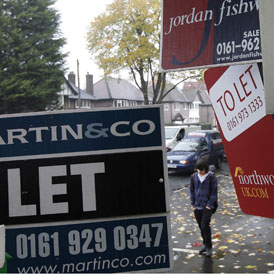Squeeze on mortgage lending pushes rents over £700 per month
Average rents in England and Wales have broken the £700 per month barrier, with rents in London averaging over £1,000 per month.

Average monthly rents in England and Wales surged through the £700 barrier last month as a shortage of new homes and mortgage constraints fuelled demand, according to new research.
Data for June from letting agent LSL Property Services showed its buy-to-let index rose by 0.7 per cent to £701, with the annual monthly rent now 4.1 per cent, or £28, higher than this time last year. Around 16 per cent of homes in England are privately rented.
The capital’s rental market is so competitive that average monthly rents broke through the £1,000 mark this month at £1,006.
London saw the biggest increase in rents over the past year with a 6.9 per cent rise, but the North East and West Midlands also saw growth at 5.1 per cent and 4.6 per cent respectively.
However this picture is not reflected across the country. The firm says that on a monthly basis, rents actually declined in three regions: the East Midlands, where they fell by 0.5 per cent, the South East and Yorkshire & the Humber, where rents fell by 0.2 per cent and 0.1 per cent respectively.
Rents obviously reflect market demand and the shortage of mortgage lending has pushed potential buyers into the rental market.
In fact, some families cannot afford to move out of a home they own but have outgrown and so are forced to seek rental accommodation.
The mortgage broker John Charcol estimates that one third of families are so-called ‘mortgage prisoners’ in that they do not have enough capital in their home to get a new mortgage so that they can move, or they simply do not satisfy lenders’ current more restrictive lending criteria.
The Association of Residential Letting Agents (Arla) says that although overall it has found the rental sector to be healthy there is a surplus of rental property in some areas of the UK, specifically the north-east of England.
Rent defaults up
As well as rents rising, some analysts are reporting a rise in the number of tenants who are running up arrears. According to LSL, landlords are as a result getting much tougher with tenants showing signs of payment difficulties, and are looking quickly to replace those who fall behind with the rent.
Arrears decreased for a second month running in June, with the unpaid total at £257m, down from £315 million in May, but LSL expects this trend to reverse in coming months as the full impact of public sector job losses comes through.
Arla has blamed this on rising living costs and wage freezes, meaning that people have less disposable income. Assured shorthold tenancy agreements also mean that tenants can find themselve homeless after six months if they cannot pay their rent.